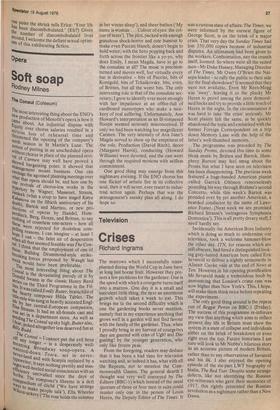OPera
Soft soap
Rodney Milnes
The Consul (Coliseum) The most interesting thing about the ENO's new production of Menotti's opera is how it cattle about. An industrial dispute with Equity over chorus salaries resulted in a serious loss of rehearsal time and threatened the opening of the company's tenth season in St Martin's Lane. The n°tion of putting in an unscheduled opera Without chorus in place of the planned revivtal of Carmen may well have proved a shrewd bargaining point: it showed that niallagement meant business. One can envisage the agonised planning meetings over What that opera should be, and how one by °Ile revivals of chorus-less works in the jrea”Petnry by Wagner, Massenet, Strauss, k:"„kql'ek (what a coup to have staged Kaiya drannva on the fiftieth anniversary of his Fath), Bartok and Martinu, or new prouctinns of operas by Handel, HumPerdinck, Berg, Henze, and Britten, to say .11t0thing of countless one-acters — how all 'nese were rejected for doubtless comtelling reasons. I can imagine — at least I "°Pe I can — the faint air of desperation When all that seemed feasible was The Contt 1. I think that the employment of one of ,t)se 13ulldog Drummond-style strikeuteaking forces proposed by Waugh last week would have been preferable, cThe most interesting thing about The l'3:01sul is the devastating parody of it by series On Swann in the classic Henry Reed
on the Third Programme in the Fif
s. It was called Emily Butter, brainchild of ! hearty Composer Hilda Tablet. The ist:e,"role was sung in heavily accented Englt',1 °Y her central-European companion, Strauss. It had an all-female cast and sewas set in a department store. As well as /fncling The Consul up sky high, Butter also, h.etir, Poked altogether less deserved fun at '111Y Budd. vrize Consul — I cannot put the evil hour t,t;' anY longer — is a desperately well4ng Broadway soap-opera. A tle.vLe re ch. _ uow n Tosca, set in never.31) er-land and with Scarpia replaced by a tsa ewriter, it says nothing prettily and masefts. well-heeled social consciences with an scr,e,..lencY unrivalled since the days of e„ 'ue. The composer's libretto is a deft :_alPendiurn of cliche ('We have strange As to Make people talk),
cox-tiekery ( Ella Wheeler 'The rose holds the summer in her winter sleep'), and sheer bathos ('My name is woman „ Colour of eyes: the colour of tears'). The plot, packed with enough gratuitous shock-horror and cute humour to make even Puccini blanch, dosen't begin to hold water; with the hero popping back and forth across the frontier like a yo-yo, why does Emily, I mean Magda, have to go to the consulate at all? The music is precisionturned and moves well, but virtually every bar is derivative — bits of Puccini, bits of Korngold, bits of Tchaikovsky, bits, even, of Britten, but all the worst bits. The only interesting role is that of the consulate secretary; I grew to identify ever more strongly with her impatience at an office-full of cardboard stereotypes who make a mockery of real suffering, Unfortunately, Ann Howard's interpretation as an ill-tempered floozie seemed seriously misconceived. If only we had been watching her magnificent Carmen. The very intensity of Ava June's Magda served to show up the emptiness of the role. Production (David Ritch), decor (Margaret Harris), conducting (Howard Williams) were devoted, and the cast went through the required motions with selfless commitment.
One good thing may emerge from this nightmare evening. If the ENO chorus has one flicker of artistic fire in its collective soul, then it will never, ever resort to industrial action again. Perhaps that was the management's sneaky plan all along. I do hope so.


































 Previous page
Previous page